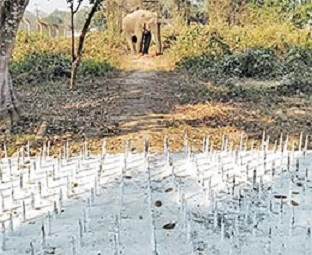Beds of six-inch long iron spikes put up in an Army cantonment in Guwahati to keep wild elephants out may have been the reason for the death of at least one pachyderm this month and injuries to several others in the past, said forest officials who had flagged this “cruel effort to keep the elephants at bay” in December 2018.
According to records with the Guwahati wildlife division, the carcass of a 9-10 year, 1500-kg male elephant was found near a stream from the Amchang Wildlife Sanctuary in Guwahati on March 4.
The post-mortem report noted “externally there are various punctured wounds on right fore and hind legs.” The report said the wild elephant died of septicemia.
The Army’s cantonment in Narengi in Guwahati where the iron spikes have been in place since 2003 in the periphery of a major supply depot in its campus, borders the Amchang wildlife sanctuary home to at least 59 wild elephants, according to officials.
“The carcass was found close to the cantonment and the nature of the injury shows that the wound was caused by the spikes,” said Pradipta Baruah, Divisional Forest Officer, Guwahati.
“The foot pads of elephants are very sensitive,” said BK Gogoi, the forest veterinary officer, Zoo division, Guwahati. “The circumstantial evidence and the post mortem suggest that the injury was caused by those spikes. How can you put these spikes?” he said.
“This Army Base is bordering the wildlife sanctuary which is an elephant habitat, and they do venture into it frequently searching for food,” said Kaushik Baruah, a conservationist who serves as the Honorary Wildlife Warden, Guwahati.
Army officials living in the cantonment claim raids by elephants on army depots are routine and often in the evening herds of pachyderms are seen in the campus.
In December 2018, another elephant was injured by these spikes. Baruah said two elephants died of septicemia in 2018.
On December 27, 2018, after receiving a report from the local range officer, Baruah wrote a letter to the Colonel in-charge of administration, Narengi cantonment noting, “On December 25 at about 2 am one wild elephant injured at supply depot of Narengi Army Cantonment while the elephant cross the pointed iron spikes driven to the ground with the sharp points facing the sky fixed at supply depot by Army personnel.”
In the letter Baruah asked the Army to do away with these types of measures. “This type of cruel effort to keep the elephants at bay is definitely going to defeat the very spirit of wildlife protection and preservation,” he wrote.
The letter according to Baruah, led to a discussion between the Army officials, the forest officials, and experts from the WWF among others in January. Baruah said measures like solar fencing and trenches were suggested to the Army.
An army spokesperson in Guwahati denied any elephants getting killed and said “directions have been received recently to remove the spikes and measures suggested by WWF officials and forest officials have been disseminated to all individuals in the cantonment.”
The spokesperson said that the spikes have been there since 2003. “As far as we are aware, there has been only one instance of injury to an elephant in 2005,” the spokesperson said adding that the incident in 2005 led to the Army digging ditches and subsequently also using ultrasonic buzzers to keep the elephants out.
The spokesperson said “the spikes have been put in areas where operational materials are being stored and shortage of them will cause operational exigencies.” According to a defence source, the supply depots in Narengi store rations for the defence forces in the Northeast.
“It’s understood that the Army is trying to protect its installations but such barriers are detrimental to the survival of elephants in that area and there have been deaths due to septicemia which they got after injuries from these spike. They should take steps to remove these barriers,” said Kaushik Baruah.
“Apart from protecting the country, the Army also has the responsibility of preserving and protecting the wildlife,” he said.
In Assam, human-elephant conflict is a routine phenomenon. According to state government records recently placed in the Legislative Assembly 249 elephants were killed since 2010 which include 20 instances of poaching, 54 deaths in train accidents, 91 which were electrocuted, 38 died of accidental reasons, 30 were poisoned, and 15 died of injuries. (Source: HT)

